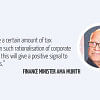Cut corporate tax for all sectors

Leading chambers and trade bodies yesterday criticised the government's 2.5 percent corporate tax cut proposal for only banks and financial institutions in fiscal 2018-19, saying the move would not bring in the desired private or foreign investments.
“The longstanding demand of the business community for reducing the corporate tax rate has not been addressed,” said the Metropolitan Chamber of Commerce and Industry in its budget reaction.
The rate of corporate tax in Bangladesh is higher than the Asian average of 21 percent and the global average of 24 percent, according to KPMG, a global network of professional firms providing audit, tax and advisory services.
Bangladesh's tax rates for companies are also higher those of Vietnam, Thailand, Malaysia, China, Indonesia, Sri Lanka and Pakistan. Vietnam and Thailand charge 20 percent tax for companies. It is 24 percent in Malaysia and 25 percent in Indonesia.
“The MCCI is disappointed that despite repeated requests and assurances over years the corporate tax rate of 35 percent and above paid by the vast majority of the companies has not been reduced to promote investment and growth.”
Out of the 314 publicly listed companies, 212 were entitled to the lower tax rate of 25 percent, it said.
The Dhaka Chamber of Commerce and Industry (DCCI) echoed the MCCI's views and urged the government to slash the corporate tax rate evenly for all sectors.
“If the government does that and reinforces us to reinvest that money into the business, we will willingly do that.”
At present, the private investment to GDP ratio is 23 percent. To raise it by 1 percentage point, Tk 25,000 crore needs to be invested in a year.
The government has set a target to increase private sector investment to GDP ratio to 25.15 percent, which will be challenging if the corporate tax rate is not cut down, the DCCI added.
The trade bodies also expressed disappointment over not increasing the tax-free income limit, which remained unchanged at Tk 2.5 lakh for the last three years.
Attaining fiscal 2018-19's tax collection target, which is 31.64 percent higher than the current year's, will be a major challenge even though the number of taxpayers has increased, the MCCI said.
It called upon the government not to burden the tax-compliant enterprises to achieve the higher revenue target. “Instead, new avenues of tax collection should be identified and pursued.”
The organisation hailed the tax incentive for green factories in the garment sector, but strongly urged the government to extend the same treatment to all industrial sectors.
While the MCCI appreciated the shrinking of VAT slabs to five from nine, it called for withdrawal of the proposed 5 percent VAT on e-commerce and ride-hailing service and continuation of the existing 4 percent VAT for supermarkets instead of the 5 percent.
“Though the country has officially adopted an 'employment led growth' model in the national planning, it is difficult to see a reflection of this in the proposed budget,” it said.
The Foreign Investors' Chamber of Commerce and Industry (FICCI) and the DCCI hailed the government for allocating Tk 100 crore for skill development projects.
The DCCI though called for tax rebate of 5 percent of gross income for any company that invest in research and development and skill development activities.
It also commended taking an initiative to form a committee to bring the country's ranking in the World Bank's Ease of Doing Business Index to below 100 notches within the next five years.
The DCCI also lauded the proposal to withdraw the practice of double taxation on dividend from next fiscal year and the decision to reduce duty on the imports of accessories for locally-manufactured motorcycle, mobile phones and tire tubes.
The MCCI expressed disappointment that no reforms have been proposed to correct the deficits of the state-owned enterprises or the non-performing loans of the state-owned commercial banks.
There is no specific mention of policies for addressing the banks and financial institutions' present situation, said the Business Initiative Leading Development (BUILD), a joint initiative of the DCCI and the MCCI.
“A bank can run when it faces capital shortfall but it cannot run when it faces liquidity shortfall. A bank facing liquidity shortfall cannot survive,” it added.
The FICCI said the proposal to make it mandatory for employers to submit statements of return submission by their employees or face audit may lead to harassment by tax officials.
Achieving 7.8 percent GDP growth would be possible if the desired level of investment flew in, the FICCI said in a statement.
It also appreciated extension of the limit of allowable perquisite to Tk 5.50 lakh. However, it recommends withdrawal of the limit entirely to align with competitive economy as the same translate into double taxation.
The Chittagong Chamber of Commerce and Industry opposed the imposition of source tax for local letters of credit as the cost of doing business would increase. It also called for a special allocation for the Dhaka-Chittagong eight-lane highway.
The Bangladesh Frozen Foods Exporters Association praised the allocation of Tk 19.59 crore for involving the rural people in agriculture and Tk 8.84 crore for livestock and fisheries development.
The trade body though demanded fixing the source tax on the export of frozen shrimps and others fish as final tax.

 For all latest news, follow The Daily Star's Google News channel.
For all latest news, follow The Daily Star's Google News channel. 







Comments